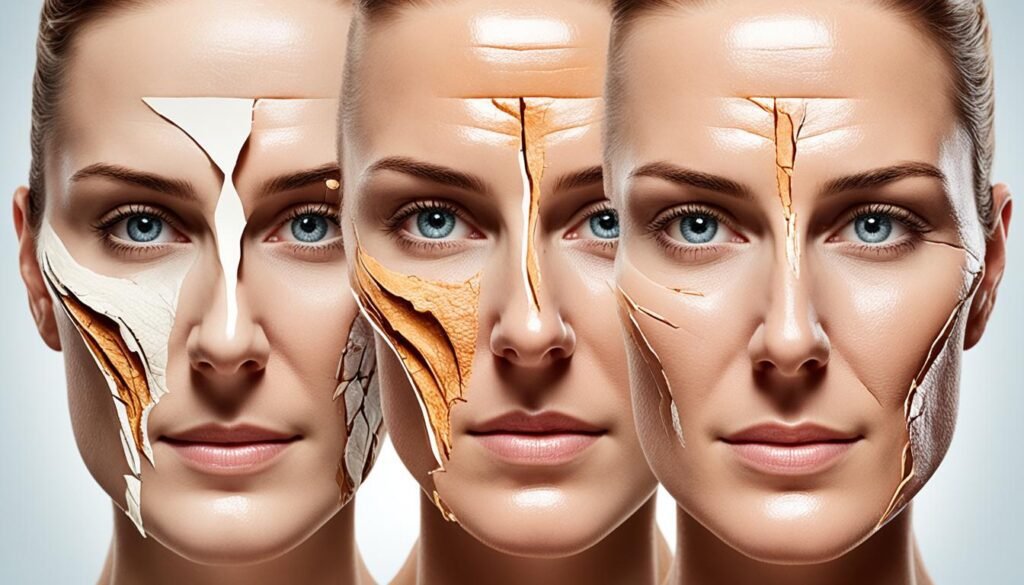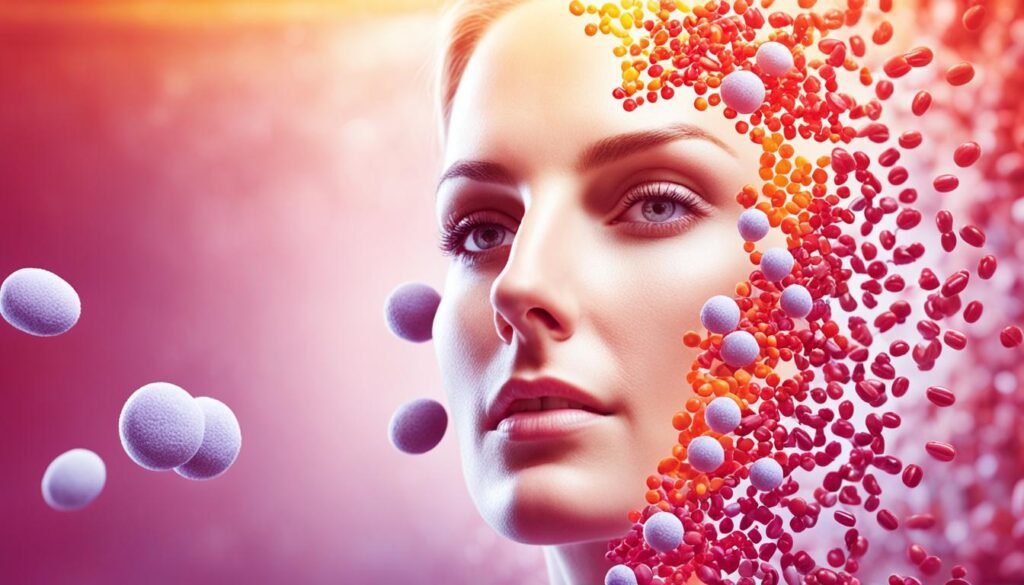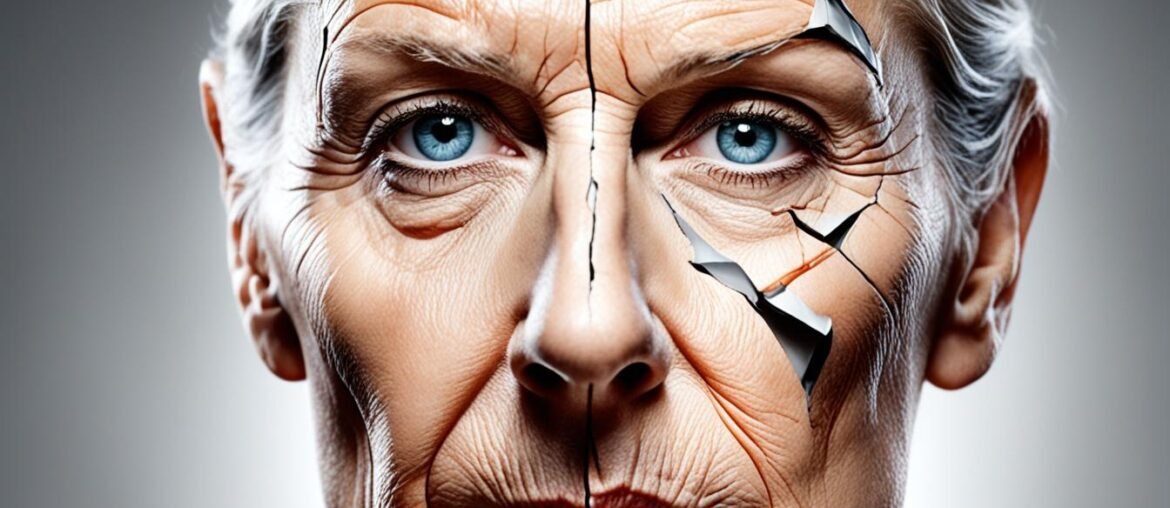Did you know that emotional stress can have a profound impact on the aging process of your skin? It’s not just external factors like sun exposure or pollution that contribute to skin aging; psychological stress plays a significant role as well. The effects of stress on the skin go far beyond temporary breakouts or redness – chronic emotional stress can lead to premature aging and long-lasting damage to your skin.
Key Takeaways:
- Emotional stress can accelerate the aging process of the skin.
- Chronic psychological stress can lead to immune dysfunction and increased production of reactive oxygen species, contributing to premature aging.
- Stress-induced aging can manifest as acne, dry skin, wrinkles, and other skin conditions.
- Hormonal changes caused by stress can promote collagen degradation and impair the skin’s ability to retain moisture.
- Stress can disrupt the skin’s barrier function, leading to increased water loss and compromised skin health.
Mechanisms of Stress-Induced Aging
Chronic emotional stress can have a profound impact on the aging process of the skin, affecting its appearance and health. Understanding the mechanisms by which stress induces aging can help us develop effective strategies to mitigate its effects. Here are some key mechanisms through which emotional stress accelerates skin aging:
- Increased Production of Cortisol and CRH: Emotional stress triggers the release of cortisol and corticotropin-releasing hormone (CRH) in the body. These stress hormones can stimulate the sebaceous glands, leading to increased oil production. Excess oil on the skin can clog pores and contribute to the development of acne.
- Impaired Barrier Function: Prolonged stress can compromise the skin’s barrier function, reducing its ability to retain moisture. This results in dryness, flakiness, and a dull complexion. When the skin is unable to adequately retain moisture, it becomes more susceptible to environmental irritants and damage.
- Weakened Immune System: Chronic stress weakens the immune system, making the skin more susceptible to infections, rashes, and inflammation. The imbalance caused by stress disrupts the natural balance of bacteria on the skin, leading to skin problems such as redness, rosacea, and eczema.
- Loss of Elasticity and Wrinkles: The repeated facial expressions and muscle tension associated with stress can contribute to the formation of wrinkles and fine lines. Stress-induced muscle tension and impaired collagen production can lead to a loss of skin elasticity, making the skin appear saggy and aged.
By understanding these mechanisms, we can take steps to counteract the detrimental effects of stress on our skin. A comprehensive approach that combines stress management techniques with a skincare routine tailored to combat stress-related aging can help preserve skin health and promote a youthful appearance.
Effects of Stress on the Skin
| Effects of Stress | Impact on the Skin |
|---|---|
| Increased cortisol and CRH production | Stimulates oil production, leading to acne |
| Impaired barrier function | Reduces moisture retention, resulting in dryness |
| Weakened immune system | Disrupts the skin’s natural balance, leading to rashes and inflammation |
| Loss of elasticity and repeated facial expressions | Contributes to the formation of wrinkles |
It is clear that emotional stress can have a profound impact on the skin’s health and appearance. By addressing the underlying causes of stress and implementing effective stress management techniques, we can mitigate the effects of stress-related skin aging and maintain a youthful complexion.
The Role of Hormones in Stress-Induced Aging
When it comes to the impact of stress on aging, hormones play a pivotal role. One hormone, in particular, stands out in its detrimental effects on the skin: cortisol. Research has shown that cortisol can promote collagen degradation, contributing to the breakdown of the skin’s support structure and the formation of wrinkles.
Collagen, a protein that provides strength and elasticity to the skin, is crucial for maintaining its youthfulness. However, cortisol can disrupt this delicate balance by accelerating collagen breakdown. As a result, the skin loses its firmness and resilience, leading to visible signs of aging.
Not only does cortisol affect collagen, but it also impairs the production of hyaluronic acid, another essential component of a youthful complexion. Hyaluronic acid helps to retain moisture in the skin, keeping it hydrated and plump. When cortisol disrupts its production, the skin becomes more prone to dryness and dullness.
The effects of cortisol and other stress hormones on the skin provide further evidence of the intricate connection between emotional stress and skin aging. By understanding the mechanisms involved, we can develop targeted strategies to mitigate the impact of stress on the skin and preserve its health and vitality.
Effects of Stress on Skin Barrier Function

Stress can have a detrimental impact on the skin’s barrier function, which plays a crucial role in maintaining healthy and hydrated skin. The outermost layer of the skin, known as the stratum corneum, acts as a protective barrier against external aggressors and helps retain moisture within the skin.
However, when exposed to chronic stress, the barrier function of the stratum corneum can be compromised. This can lead to increased water loss from the skin, resulting in dryness and potential damage. The disrupted barrier function may also impair the skin’s ability to heal itself, further compromising its overall health.
Research has shown that stress-induced alterations in the stratum corneum can impact factors such as water retention, moisture balance, and lipid content. These changes can contribute to the development of various skin conditions, including dryness, sensitivity, and inflammation.
Impact of Stress on Water Retention in the Skin
One of the key consequences of stress on the skin is the disruption of water retention. The stratum corneum normally acts as a barrier against excessive water loss, keeping the skin adequately moisturized. However, under conditions of chronic stress, this barrier can become weakened, resulting in increased transepidermal water loss (TEWL).
Increased TEWL can lead to dryness, roughness, and a compromised moisture barrier, making the skin more susceptible to damage from environmental factors. This can exacerbate existing skin conditions or contribute to the development of new ones.
According to studies, stress-related hormone imbalances, such as elevated cortisol levels, can interfere with the skin’s natural hydration mechanisms. Cortisol has been shown to decrease the production of hyaluronic acid, an important molecule involved in water retention, further compromising the skin’s ability to retain moisture.
Furthermore, stress-induced changes in the lipid structure of the stratum corneum can disrupt the skin’s natural moisture balance. The disrupted lipid matrix can increase the permeability of the skin, allowing water to escape more easily and leading to dryness.
Quotes:
“The skin’s barrier function is crucial for maintaining healthy and hydrated skin. However, chronic stress can disrupt this protective barrier, leading to increased water loss and dryness.” – Dr. Emily Roberts, Dermatologist
“Stress can alter the structure and function of the stratum corneum, compromising its ability to retain moisture and protect the skin. This can result in dryness, sensitivity, and other skin issues.” – Dr. Sarah Johnson, Researcher
| Effects of Stress on Skin Barrier Function | Consequences |
|---|---|
| Increased water loss from the skin | Dryness, dehydration |
| Impaired skin healing | Delayed recovery from damage |
| Disrupted moisture balance | Increased susceptibility to environmental damage |
| Changes in lipid structure | Compromised natural hydration mechanisms |
Table: Effects of Stress on Skin Barrier Function
To combat the effects of stress on the skin barrier function, it is essential to develop effective stress management strategies. Practicing stress-reducing techniques, such as mindfulness, deep breathing exercises, and self-care activities, can help alleviate the negative impact of stress on the skin.
A healthy skincare routine that includes gentle cleansing, moisturizing, and protection from external aggressors can also support the restoration of the skin’s barrier function. Additionally, incorporating skincare products with ingredients like ceramides, hyaluronic acid, and niacinamide can help strengthen and maintain the skin’s moisture barrier.
Immune Dysregulation and Skin Aging
Chronic stress can have a significant impact on the immune system, leading to dysregulation and increased vulnerability to various skin diseases. The body’s response to stress can trigger inflammation, further exacerbating skin conditions. Additionally, stress disrupts the natural balance of bacteria on the skin, contributing to redness, rashes, and other inflammatory reactions.
Conditions such as psoriasis, eczema, and contact dermatitis can be worsened by the immune dysfunction caused by chronic stress. The skin’s innate ability to defend against external aggressors is compromised, resulting in prolonged and intensified symptoms. Furthermore, stress-induced inflammation can damage the skin’s integrity, leading to skin aging and increased susceptibility to environmental damage.
Addressing stress and its impact on the immune system is crucial for maintaining healthy skin. By managing stress levels and adopting strategies to promote emotional well-being, individuals can help mitigate the effects of immune dysregulation and reduce the risk of developing or worsening skin conditions.
“Chronic stress can disrupt the immune system, leading to increased inflammation and susceptibility to skin diseases.”
The Role of Stress in Skin Diseases
Stress-induced inflammation can significantly affect the development and progression of various skin diseases. Here are some common skin conditions influenced by stress:
- Psoriasis: Stress can trigger flare-ups and worsen symptoms of psoriasis, an autoimmune condition characterized by red, scaly patches on the skin.
- Eczema: Stress has been shown to exacerbate eczema symptoms, including itching, dryness, redness, and inflammation of the skin.
- Contact Dermatitis: Stress can increase sensitivity to certain substances, leading to allergic reactions and contact dermatitis.
Reducing Stress for Healthy Skin
Managing stress is vital for maintaining skin health and preventing immune dysregulation. Incorporating stress-reducing practices into daily life can have a positive impact on skin and overall well-being. Here are some strategies to consider:
- Stress Management Techniques: Engage in activities that promote relaxation and reduce stress levels, such as meditation, deep breathing exercises, and mindfulness.
- Maintain a Healthy Lifestyle: Prioritize a balanced diet, regular exercise, and adequate sleep to support overall physical and mental health.
- Seek Emotional Support: Connect with loved ones, join support groups, or consider therapy to help manage stress and develop healthy coping mechanisms.
- Practice Self-Care: Engage in activities that bring joy and promote self-care, such as taking baths, practicing skincare rituals, or enjoying hobbies.
By implementing these stress management strategies, individuals can support immune function, reduce inflammation, and maintain healthier skin.
| Stress-Related Skin Conditions | Symptoms |
|---|---|
| Psoriasis | Red, scaly patches on the skin |
| Eczema | Itching, dryness, redness, inflammation |
| Contact Dermatitis | Allergic reactions, skin inflammation |
Psychological Stress and Oxidative Stress
Psychological stress can have a profound impact on our overall health, including the health of our skin. One important aspect connecting stress and skin aging is the phenomenon of oxidative stress.
Oxidative stress occurs when there is an imbalance between the production of reactive oxygen species (ROS) and the ability of our body to counteract their harmful effects through antioxidant defenses. Under normal circumstances, our body has a natural defense system to neutralize ROS. However, when we experience psychological stress, this delicate balance can be disrupted.
Stress-induced oxidative stress can lead to the production of excessive ROS, which can cause damage to cellular structures, including the skin. These ROS can target lipids, proteins, and DNA, leading to oxidative damage and cellular dysfunction.
The skin is particularly vulnerable to oxidative stress due to its constant exposure to environmental stressors such as UV radiation, pollution, and toxins. When combined with psychological stress, the skin’s antioxidant defenses can become overwhelmed, leading to accelerated skin aging.
Image: Reactive oxygen species (ROS) and their impact on skin aging.
Antioxidant therapies have shown promise in mitigating the effects of stress-induced oxidative stress on the skin. These therapies work by neutralizing ROS and preventing oxidative damage. Examples of antioxidants commonly used in skincare include vitamins C and E, coenzyme Q10, and botanical extracts.
It is important to note that while antioxidant therapies can provide some protection against stress-induced skin aging, they should not be considered a standalone solution. Managing psychological stress through healthy lifestyle habits and stress reduction techniques remains essential for maintaining overall skin health.
By understanding the connection between psychological stress and oxidative stress, we can take proactive steps to protect our skin from premature aging. Incorporating antioxidant-rich skincare products and adopting stress management strategies can help us maintain healthy and youthful-looking skin.
Potential Therapeutic Strategies for Stress-Induced Skin Aging

Although further research is needed, some potential therapeutic strategies for stress-induced skin aging have been proposed. Topical pharmacologic interventions offer a targeted approach to prevent and reduce the effects of stress on the skin. The following interventions show promise in protecting skin health:
Beta-Blockers
Beta-blockers, commonly used to treat heart conditions, have been explored for their potential benefits in skin aging. These medications work by blocking the effects of adrenaline and stress hormones on the body’s systems, including the skin. By reducing the physiological response to stress, beta-blockers may help counteract the negative effects of stress on the skin’s aging process.
Angiotensin Receptor Blockers
Angiotensin receptor blockers, primarily prescribed for hypertension management, have shown potential in combating stress-induced skin aging. These medications work by blocking the effects of angiotensin II, a hormone that plays a role in increasing blood pressure and promoting inflammation. By inhibiting angiotensin II, these medications may help reduce the inflammatory response triggered by chronic stress and protect the skin from accelerated aging.
Glucocorticoid Blockers
Glucocorticoid blockers, such as topical corticosteroids, have been used for their anti-inflammatory properties in various dermatological conditions. In the context of stress-induced skin aging, these medications may help mitigate the inflammatory response caused by chronic stress and prevent the breakdown of collagen and elastin, which are crucial for maintaining the skin’s elasticity and youthful appearance.
Cholinergic Modulators
Cholinergic modulators, which target the cholinergic system in the body, have shown potential in managing stress-related symptoms. While their exact mechanisms of action in skin aging are still being explored, these modulators may help regulate the stress response and minimize the detrimental effects of stress on the skin’s structure and function.
It is important to note that these potential therapeutic strategies for stress-induced skin aging are still in the early stages of research. Further studies are needed to determine their efficacy, safety, and optimal application in clinical practice. Additionally, a personalized approach that considers an individual’s specific health needs and skin condition is crucial when implementing these interventions.
The Link Between Stress and Other Aging Factors
Stress doesn’t just affect our skin; it can also impact other factors related to aging. Let’s explore the direct relationship between stress and other common signs of aging.
1. Stress and Gray Hair
Chronic stress has been associated with premature graying of hair. Although the exact mechanism is not fully understood, it is believed that stress can accelerate the depletion of pigment-producing cells in the hair follicles, leading to the appearance of gray hair at a younger age.
2. Stress and Hair Loss
Stress-induced hair loss is a common concern among individuals experiencing significant emotional stress. Telogen effluvium, a condition characterized by excessive shedding of hair, can be triggered by the physiological changes caused by stress. While the hair loss is usually temporary, managing stress is crucial for maintaining healthy hair growth.
3. Stress and Tooth Damage
Stress can manifest in various ways, and one common manifestation is teeth grinding or clenching, a condition known as bruxism. Over time, chronic bruxism can lead to tooth damage, including tooth fractures, enamel erosion, and jaw pain. Additionally, stress can contribute to temporomandibular joint dysfunction (TMD), causing discomfort and impaired jaw function.
Understanding the connection between stress and these aging factors highlights the importance of effective stress management for overall health and a youthful appearance.
Now, let’s take a closer look at some potential therapeutic strategies for combating stress-induced skin aging.
Coping with Stress to Preserve Skin Health
To preserve skin health and prevent stress-induced aging, it is important to develop effective stress management strategies. Stress management techniques can help reduce the impact of stress on the skin and promote a healthier overall appearance.
Here are some practical lifestyle habits that can assist in managing stress:
- Maintain a Healthy Diet: Consuming a balanced diet rich in fruits, vegetables, whole grains, and lean proteins can provide the body with essential nutrients that support skin health. Avoid excessive consumption of sugar, processed foods, and caffeine, which can exacerbate stress.
- Ensure Adequate Sleep: Getting enough sleep is crucial for stress reduction and overall well-being. Aim for 7-9 hours of quality sleep each night to allow your body and skin to rejuvenate.
- Engage in Regular Exercise: Physical activity is an effective stress reliever. Engaging in regular exercise can help reduce cortisol levels, improve mood, and promote healthy blood circulation, which is beneficial for the skin.
- Schedule Relaxation Activities: Setting aside regular time for relaxation activities can help soothe the mind and body. Consider practices such as meditation, deep breathing exercises, yoga, or engaging in hobbies that bring joy and relaxation.
- Seek Support from Others: Sharing your feelings and experiences with trusted individuals can provide emotional support and perspective. Surround yourself with a supportive network of friends and family members who can lend an ear or offer advice during stressful times.
- Avoid Drugs and Alcohol: Substance abuse can exacerbate stress and negatively impact skin health. It is crucial to avoid dependency on drugs or alcohol as a coping mechanism and instead seek healthier alternatives for managing stress.
By incorporating these stress management strategies into your daily routine, you can better protect your skin from the detrimental effects of stress and promote a healthier and more youthful appearance.
The Power of Relaxation Activities
“Relaxation activities, such as meditation and deep breathing exercises, can help reduce stress levels and promote a sense of calm and well-being. By incorporating these activities into your routine, you can improve your overall skin health and maintain a youthful appearance.”
Conclusion
Emotional stress has a significant impact on skin aging, affecting various aspects of skin health. Chronic stress disrupts the barrier function of the skin, compromises immune function, and accelerates collagen degradation. To combat the effects of stress on the skin and promote overall skin health and youthfulness, it is essential to implement stress management techniques and adopt a healthy lifestyle.
By prioritizing stress management, individuals can significantly reduce the negative impact of emotional stress on skin aging. Engaging in relaxation activities, maintaining a balanced diet, getting enough sleep, exercising regularly, and seeking support from others can all contribute to stress reduction. Additionally, avoiding drugs and alcohol is crucial, as they can exacerbate stress and its effects on the skin.
By understanding and addressing the link between stress and skin health, individuals can develop effective preventive strategies. By taking care of their mental and emotional well-being, they can maintain a healthy, youthful complexion for years to come.
FAQ
What is the impact of emotional stress on skin aging?
Emotional stress can have a significant impact on skin aging. Chronic psychological stress can lead to immune dysfunction, increased production of reactive oxygen species, and DNA damage, all of which contribute to premature aging of the skin.
How does stress induce aging in the skin?
Stress induces aging in the skin through various mechanisms. It can stimulate oil production, leading to acne, impair the skin’s barrier function, resulting in dry skin, weaken the immune system, leading to rashes and inflammation, and contribute to the formation of wrinkles through repeated facial expressions.
What role do hormones play in stress-induced aging?
Hormones, such as cortisol, play a significant role in stress-induced aging. Cortisol promotes collagen degradation, leading to the breakdown of the skin’s support structure and the formation of wrinkles. It also impairs the production of hyaluronic acid, a molecule that helps retain moisture in the skin.
How does stress affect the skin’s barrier function?
Stress can disrupt the skin’s barrier function, which is essential for maintaining healthy and hydrated skin. It impairs the barrier function of the stratum corneum, the outer layer of the skin, leading to increased water loss and dry skin. Stress also slows down the skin barrier’s ability to heal itself, further compromising skin health.
What is the link between stress and immune dysregulation?
Chronic stress can dysregulate the immune system, leading to increased inflammation and susceptibility to skin diseases. Stress disrupts the balance of bacteria on the skin, leading to increased redness and rashes. It can also worsen conditions such as psoriasis, eczema, and contact dermatitis.
How does psychological stress contribute to oxidative stress in the body?
Psychological stress can increase oxidative stress in the body, leading to the production of reactive oxygen species (ROS). These ROS can damage cellular structures, including the skin, and contribute to the aging process.
Are there any potential therapeutic strategies for stress-induced skin aging?
Some potential therapeutic strategies for stress-induced skin aging have been proposed. These include topical use of beta-blockers, angiotensin receptor blockers, glucocorticoid blockers, and cholinergic modulators to target specific pathways affected by stress and protect skin health.
Does stress have an impact on factors other than the skin?
Yes, stress can impact other factors related to aging. It has been associated with premature graying of hair and hair loss. Stress can also cause tooth damage, such as teeth grinding and temporomandibular joint dysfunction (TMD).
How can I cope with stress to preserve skin health?
To preserve skin health and prevent stress-induced aging, it is important to develop effective stress management strategies. This can include scheduling time for relaxation activities, maintaining a healthy diet and adequate sleep, staying active through exercise, and seeking support from others.
What is the conclusion regarding the impact of emotional stress on skin aging?
Emotional stress has a significant impact on skin aging. Understanding the mechanisms involved can help in developing effective preventive strategies. By implementing stress management techniques and adopting a healthy lifestyle, it is possible to combat the effects of stress on the skin and promote overall skin health and youthfulness.




